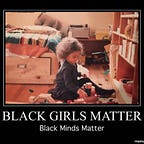Yom Kippur Haftorah: Black Lives Matter
You shall love people — including Black people — with all your heart
I shared this with my synagogue during Yom Kippur 5777 Shacharit services.
To grow up Black in America is to know that your humanity is always in question.
I have a lot of memories of this from my childhood, but one stands out in particular.
When I was 15, I was thrown out of a New Year’s Eve party because Black people — or as they repeatedly shouted at me, N-words — were not welcome.
Later, when I was an 18 year old college sophomore, a white Jewish leader of Harvard Hillel yelled at me that I was an anti-Semite because I was at a peace rally organized by Arab students. She could not imagine that someone my color was an Ashkenazi Jew too.
Now at 34, every time my mother calls me, I think it’s to tell me one of my cousins is dead. Or in jail. A couple of weeks ago a phone call from a cousin was in fact about another one who was in jail, falsely accused by a white person who wanted to teach her a lesson.
In 2016, I assume that every conversation with one of my Black friends and family members may be our last one. My friends and family are located close to the places where Black people have been the victims of extrajudicial police murders. Whenever I hear the news, I wait — in complete terror — for a name. And I have given instructions to my husband about what to do if it’s me.
I find too often that white Jews hear stories like this and think, “That’s sad for them. I will act in solidarity when I can.” As we think about making the world whole, about Teshuvah and our commitment to Tikkun Olam and respecting and loving G-d, the G-d that we make together, I believe this approach should be questioned.
Why? Because Black people are People. What is happening is an affront to all of us, not just those of us who are Black. It is time to stop treating this like it is a grief that only Black people can feel and understand, as if Blacks are somehow a different species.
In fact, it is hard to be Black and Jewish in a community that does not see how alienating this approach can be. I have thought many times, in the last two months especially, about walking away from Judaism because I did not feel fully acknowledged as a fellow human.
I don’t believe this outcome is fated though. Albert Einstein — my theoretical physics hero — said that racism is a disease of white people, and he included himself in this grouping. He didn’t write this during the Days of Awe, but I think it is a good framing of what matters during this time.
As we end the days of awe, I want my fellow Jews who are not Black to consider that repentance means in part to take responsibility and repair what you can.
Part of this repair in my view is recognizing that Black Lives, Native Lives, Latinx lives are your people’s lives. Not just because there are Jews of all of those races but also because part of tikkun olam must be recreating the wholeness of humanity.
The message of Tikkun Olam is clear to me: Black Lives Matter can’t just be a movement you support. It has to be personal for you, like your family’s life depended on its success.
Think of the times you have imagined early Nazi Germany and the terror Jews felt walking down the street, Jews like my uncle’s family. We, your fellow Americans, your fellow human beings, are terrified, walking down the street. And we are, too often, terrorized in the name of whiteness, in the name of white safety.
It’s time to reject that and say: Black Lives Matter, like they are the lives of your family members.
Read more about Black Lives Matter Jewish mourning rituals.
Anti-Racism as a Sacred Jewish Value by Rabbi Brant Rosen
Jewish solidarity with Black Lives Matter by Rabbi Brant Rosen
“Let us not value property over people; let us not protect material objects while human lives hang in the balance.” — Dr. Yolanda Pierce, A Litany for Those Who Aren’t Ready for Healing
